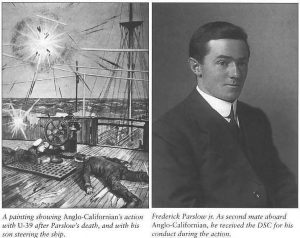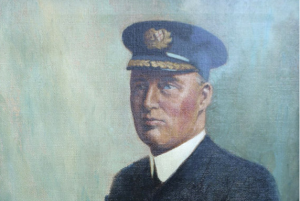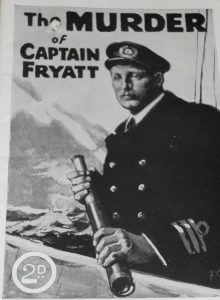- Author
- Rivett, Norman C
- Subjects
- Biographies and personal histories, History - WW1
- Tags
-
- RAN Ships
- None noted.
- Publication
- March 2019 edition of the Naval Historical Review (all rights reserved)
An article in the December 2018 edition of this magazine on Victoria Crosses makes no mention of the award to civilian recipients, in particular two Mercantile Marine1officers. The following may be of interest.
Captain Frederick Parslow VC
The lowly horse transport SS Anglo-Californian, owned by Short Bros of Sunderland, had nearly completed her voyage from Canada to England with a cargo of 927 horses destined for the Western Front. On 4 July 1915 she was shelled by the submarineU-39. Her master Frederick Parslow tried in vain to evade the shots but after making an SOS, and with his ship severely damaged, was forced to stop and abandon her. While boats were being prepared a radio message was received telling him to hold on as long as possible as help was on its way. Accordingly, the Captain managed to get his ship underway again but in the ensuing action he was mortally wounded and 21 of his crew died. His son, who was Second Mate, (also named Frederick Parslow) assumed command. About an hour later two destroyers approached and the submarine dived.
The ship was towed into port and after repairs was sold and renamed Vandalia.Ironically, when on passage from England to Canada on 9 June 1918, in a similar position to her previous encounter with a submarine, this vessel was sunk by U-96.
A newspaper article of the former event concludes as follows: Captain Parslow set a splendid example to the officers and men of the Mercantile Marine. Later for most conspicuous gallantry and devotion to duty Captain Parslow was posthumously recommended for the award of a Victoria Cross and his son, who helped save the ship and her cargo, for the award of the Distinguished Service Cross.

Captain Archibald Bisset Smith VC
The New Zealand Shipping Company’s SS Otaki,under command of Captain Archibald Bisset Smith, was on passage from New York to London when on 10 March 1917 in the mid-Atlantic she sighted the German raiderSMS Möwe,Otaki was armed with one 4.7-inch (119 mm) gun intended to ward off surfaced submarines; Möwewas armed with 4 x 5.9-inch (150 mm) guns and 1 x 22 pounder (105 mm) gun, plus two torpedo tubes and mines.
The raider called on Otakito stop but Captain Bisset Smith refused and in the ensuing action recorded a number of hits on Möwecausing considerable damage; five of her crew were killed and another 10 injured. But Otaki herself was severely damaged and on fire. The Captain ordered his crew to abandon ship but he remained and with five comrades went down with his ship. A later enemy account of this action termed it a gallant duel. For his gallant action against overwhelming odds Captain Bisset Smith was. posthumously recommended for the award of the Victoria Cross.

Captain Charles Fryatt
Charles Fryatt was an experienced master of British railway ferries crossing the North Sea. On 3 March 1915 when he was in command of SS Wrexham,she was attacked by a German U-boat. While making maximum speed his ship was chased for forty miles before making the safety of Rotterdam. For this feat his employers presented him with an inscribed gold watch.
A few weeks later on 28 March, Captain Fryatt, now in command of SS Brussels, was off the Dutch coast when ordered to stop by U-33. Instead the Captain ordered full ahead and attempted to ram the submarine which was obliged to crash dive. This action was in accordance with instruction given to captains of British merchant ships. For this second action Captain Fryatt also received an inscribed gold watch, this time presented by the Admiralty.
These insults to the German Navy did not go unnoticed and on 25 June 1916 when SS Brusselsclearedthe neutral Hook of Holland she was surrounded by five German destroyers. The ship was boarded and taken to nearby occupied Belgium where the passengers were released but the crew became prisoners of war.
In the Belgium city of Bruges Captain Fryatt was court-martialed and charged with attempting to destroy a German submarine. On 27 July 1916 he was found guilty and sentenced to death. On the same day he was executed by firing squad and buried on the outskirts of the city.

There was an international outcry and his execution was widely condemned. His Majesty King George V in a letter to Captain Fryatt’s widow wrote: The action of Captain Fryatt in defending his ship against the attack of an enemy submarine was a noble instance of the resource and self-reliance so characteristic of his profession.
Possibly owing to the politically sensitive civilian/military situation caused by this case Captain Fryatt was only posthumously awarded Belgian honours and decorations. In 1919 Captain Fryatt’s remains were exhumed and returned to England aboard the destroyer HMS Orpheus. A state funeral was held at St Paul’s Cathedral with a naval escort preceded by drummers of the Royal Marines – thousands lined the streets. His body was finally laid to rest in the churchyard in his home village of Dovercourt, fittingly overlooking the sea near the ferry port of Harwich.
Award of Victoria Crosses
The situation regarding the award of honours to Captains Parslow and Bisset Smith remained unresolved with the Admiralty being unable to reconcile the problem. His Majesty, who because of his naval service was known as ‘Our Sailor King’, remained firmly of the opinion that these two officers needed recognition and ordered that a solution be found. Accordingly, both officers and Frederick Parslow junior were retrospectively given commissions in the Royal Naval Reserve which allowed His Majesty to posthumously confer these great honours which were accepted by the next of kin of both Captain Parslow and Captain Bisset Smith. Frederick Parslow (junior) was awarded the Distinguished Service Cross.
Captain Bisset Smith’s medals were later acquired by the New Zealand Shipping Company and displayed in a cabinet in the officers’ saloon of another MV Otaki.With her demise they are now held by the P & O Company’s Heritage Collection.
In memory of Captain Bisset Smith his family presented the Otaki Shield to his old school, Robert Gordon College, in Scotland as an annual award to a senior student judged ‘pre-eminent in character, leadership and athletics’. This is accompanied by six weeks as the Otaki Scholar visiting schools in New Zealand. Captain Bisset Smith married in New Zealand and is closely associated with that country.
Summary
We leave it to the reader to decide whether or not Victoria Crosses were awarded to civilians. Within the exigencies of war and the haze of battle, lines are crossed and the distinction between rules and regulations can be less than clear. What is the status of the captain of an armed ship such as Otaki which opens fire upon an enemy? And in the case of the heroic Captain Fryatt, was his execution a message to likeminded aggressive merchantmen, not to endanger enemy ships?
Notes:
At this time the term Mercantile Marine was in common use and the title Merchant Navy was not bestowed by King George V on British merchant shipping until 1928. The Mercantile Marine Medal, established in 1919, was awarded to members of the Mercantile Marine who had served at sea for not less than six months between 4 August 1914 and 11 November 1918.




